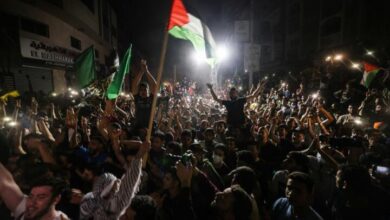
Providing effective legal and judicial guarantees to ensure the success of the Palestinian legislative and presidential elections
Date: 27 Jan 2021
Press Release
Providing effective legal and judicial guarantees to ensure the success of the Palestinian legislative and presidential elections
The International Commission to Support Palestinians’ Rights (ICSPR) highly appreciates your well-known role in ensuring the promotion of human rights.
With reference to the above subject, the Palestinian President Mahmoud Abbas issued a presidential decree setting the dates for holding the comprehensive Palestinian elections consecutively, as the legislative elections will be held on 22 May 2021, the presidential elections on 31 July, and the National Council on 31 August.
the International Commission for Supporting Palestinian Rights (ICSPR) sent all the institutions of the international community Among them: Secretary-General of the United Nations , High Commissioner for Human Rights ,United Nations Peace Process Coordinator, President of the Human Rights Council , UN Special Rapporteur on human rights in the occupied Palestinian territory , UN Special Rapporteur on the right of everyone to the enjoyment of the highest attainable standard of physical and mental health and UN Special Rapporteur on the right to development.
In this regard, ICSPR is pleased to share with you its view regarding the necessary political, legal and judicial guarantees to provide a suitable environment for holding elections:
- Providing the political environment for elections: The holding of elections requires a political environment to provide all the requirements for its integrity and success by adopting practical goodwill steps that include the immediate abolition of the sanctions imposed on the Gaza Strip, the release of arbitrary and political detainees, and holding the temporary leadership framework to activate the PLO, respect public freedoms, including freedom of opinion and expression, the cessation of political disputes and exclusion policies, and the cessation of any form of summons for political reasons or matters related to party and political affiliation or activity in the West Bank and Gaza Strip.
- The Central Elections Commission: The need for the Central Elections Commission to carry out its democratic, professional and independent work in organizing, managing and controlling the electoral process, ensuring unified efforts for the success of the electoral process and playing its role with other parties to ensure broad community participation, and sponsoring an electoral charter of honor between all parties competing in the elections, and providing all the positive climates necessary to activate the role of internal and external oversight bodies over the electoral process.
- Election law: Elections in all their stages must be governed by a law that organizes them. The law is the determining factor for the standards for conducting elections, which requires the need to review all legal texts regulating the electoral process, on the basis of ensuring the existence of a consensual electoral law that comes in the context of a societal dialogue that preserves democratic life and works to consecrate the principle of pluralism and prevent exclusion. Although there is consensus on the system of comprehensive proportional representation and some claims, no agreement has been reached on which law the elections will be based on, the law by decision on presidential elections and the Legislative Council of the National Authority No. (1) of 2007 and its amendments, or the amendment of the election law approved by the Legislative Council of 2005. It seems that the president decided the matter in the election decree that the Decree Law No. (1) of 2007 is the law on which the elections will take place, despite the presence of amendments by the President in approving the election of a head of state instead of the authority, even if this requires an amendment in the Basic Law and other amendments to the election law. The law emphasized that elections should be conducted according to a comprehensive proportional representation system, considering the Palestinian territories as one electoral district, and whoever wishes to run for elections must be presented on an electoral list with no less than 16 candidates, thus providing a real guarantee for political pluralism and prevents exclusivity as much as possible in managing public affairs. However, this system must add clear texts that prevent further controversy, whether in the nature of the dealings by the Election Commission with candidates’ lists, and does dropping some of the candidates mean dropping the list, the conditions for candidacy, the distribution of votes and seats, the exit of a member from the list to another list after the election and other questions.
- About the electoral court and appeals: The election law stipulated the formation of an election court consisting of a president and eight judges, upon the recommendation of the Supreme Judicial Council, and perhaps this text was the subject of discussion in Cairo, where the Cairo Reconciliation Agreement agreed that consensus should be reached on its formation and the selection of judges who enjoy integrity, transparency and independence. Especially in light of the absence of the unity of the judiciary and the lack of guarantees for its independence in the Gaza Strip and the West Bank, and in light of the Palestinian President Mahmoud Abbas on 11 January 2021, issued four new decisions related to the judicial affairs in Palestine, which are: Law No. (40) of 2020 amending the Authority Law Judicial No. (1) of 2002, the decision by law No. (39) for of 2020 regarding the formation of regular courts, and the decision by law No. (41) of 2020 regarding the administrative courts. In addition to the decision to promote a number of First Instance judges to appeal judges, and a decision to refer six judges to early retirement based on a placement from the Transitional Supreme Judicial Council without any compelling legal reasons, which confirms the exclusionary nature of the decision, and a decision appointing Judge Issa Abu Sharar, former president of the Transitional Judicial Council (86) years, as president of the Supreme Judicial Council, and Judge Farid Aql his deputy. These decisions, which were rejected by all the forces of society, especially the Bar Association, were viewed as a means of further undermining the Palestinian judicial authority and a picture of the continued domination and encroachment of the executive authority over the judiciary. This puts big question marks about the expected role of the judiciary in the upcoming elections.
- Censorship and freedom of electoral campaign propaganda: Work to provide complete freedom of political campaign, publishing, and holding political and electoral meetings without harassment and without the need for prior permission, while ensuring the impartiality of the security services in the West Bank and the Gaza Strip and not interfering with elections or propaganda for any political party and does not affect the course of the electoral process, and prohibiting the use of ministries and official bodies in the interest of any party or list participating in the elections, providing equal opportunities for all the forces and lists participating in the official media without discrimination, and organizing government financial funding for electoral campaigns in a way that guarantees justice and equality, equal opportunities for all the lists and participating forces and providing equal support to them, in addition to their full compliance with the law and international standards for conducting elections and not agreeing to exclude any of the candidates or electoral lists as long as they meet the legal conditions and in a manner that guarantees the integrity of their role and the independence of their decision. With the importance of working existing an international and internal supervision of the elections, to ensure that the occupation does not interfere in favor of an electoral team or list, or to ensure that it is not locally rigged, which protects the will of the electorate and protects the elected representatives.
In light of the foregoing, we look forward to your role in monitoring the upcoming Palestinian elections, hoping that you will work seriously with and alongside all concerned parties to:
- Pressuring the Israeli military occupation forces to ensure conducting the elections in the Palestinian capital (Jerusalem) and not to create obstacles for citizens to exercise their right to run and vote, and the immediate release of Palestinian representatives detained in Israeli prisons.
- Pressing all parties to ensure that Palestinian elections take place on the date specified in the presidential decree, in a way that renews national legitimacy and strengthens the process of democratic transformation in the country, and to ensure that no Palestinian is excluded from participating in these elections.
- Pressuring the Palestinian presidency to immediately reverse the package of decisions by laws relating to the judiciary and work to strengthen its role as an independent authority, and the serious pursuit of forming an election court away from the current transformation of the executive authority.
- Pressuring the Palestinian authorities in both the West Bank and the Gaza Strip to take serious action to create a suitable environment for holding the elections. Respect for the system of human rights and public freedoms, and avoid the approach of excluding any Palestinian who wishes to run under flimsy and illegal justifications.





